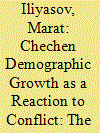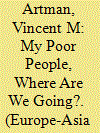| Srl | Item |
| 1 |
ID:
170356


|
|
|
|
|
| Summary/Abstract |
This article presents the views of émigré Chechens on the reasons behind the particular patterns of demographic growth of Chechnya. The main driving force, identified by the respondents interviewed in the research, is the fear of national extinction. The traditional obligation for Chechen men to defend the homeland adds another explanation: the Chechen respondents consider demographic growth to be related to preparedness for war. Both explanations are related to the perception of Russia as an imminent threat. A range of other factors was mentioned by smaller numbers of respondents. The article concludes that Chechen demographic growth is related to the unresolved Russo–Chechen conflict.
|
|
|
|
|
|
|
|
|
|
|
|
|
|
|
|
| 2 |
ID:
170354


|
|
|
|
|
| Summary/Abstract |
This article analyses activists’ attitudes towards using social media for civic actions in authoritarian and democratising countries. Specifically, it examines whether civic activists in Belarus and Ukraine perceive social media as ‘liberation technology’ or as unhelpful and overhyped, a ‘net delusion’. We compare the ways in which civic activists use social media for the purpose of spreading information, networking and mobilisation. We find that social media is used by them for civic activism in order to campaign for civil and political liberties in their countries. Civic activists are generally enthusiastic about the use of social media, however we highlight challenges arising from socio-political conditions as well as negative consequences of activists’ online engagement.
|
|
|
|
|
|
|
|
|
|
|
|
|
|
|
|
| 3 |
ID:
170357


|
|
|
|
|
| Summary/Abstract |
Although Islam is described as a fundamental aspect of Kyrgyz national identity, its theological aspects are generally elided in nationalist discourse. However, as Islam becomes more prominent in Kyrgyz society, anxieties about ‘Arabisation’ and the weakening of national traditions permeate popular and political discourse. These anxieties operate simultaneously in the national and religious registers, suggesting the extent to which theological beliefs inform national identity, even in secular states. Examining a recent controversy over veiling in Kyrgyzstan, this article argues that theology is both linked to nationality and also a site of contestation over the terms of nationalism itself.
|
|
|
|
|
|
|
|
|
|
|
|
|
|
|
|
| 4 |
ID:
170352


|
|
|
|
|
| Summary/Abstract |
This article aims to explain the alternation of phases in Soviet nationalities policy through developments in foreign policy, demonstrating the alternation of ‘soft’ and ‘hard’ waves. Drawing upon Randall Collins’ geopolitical theory within a broader historical macrosociology perspective, I examine the effect of geopolitical tensions on the patterns of nationalities policy. Collins argues that geopolitical stability positively affects multiculturalism, while periods of geopolitical tension are associated with assimilation. I test Collins’ theory using a dataset on USSR engagement in international conflicts between 1926 and 1991. The results conform to our theoretical expectations: international security issues had a significant effect on Soviet nationalities policy.
|
|
|
|
|
|
|
|
|
|
|
|
|
|
|
|
| 5 |
ID:
170355


|
|
|
|
|
| Summary/Abstract |
The events preceding the 2013 Maidan protests exemplified Russia's use of its economic power over Ukraine. In trying to prevent Kyiv leaving its orbit, Moscow threatened economic rupture and closed borders, used phytosanitary and technical norms to impose import bans, and demanded swift payment of Ukraine's debt to Russia. Accompanying these negative measures were incentives: Russia promised Ukraine significant concessions in the form of loans or preferential trade treatment. As a result of this pressure, President Viktor Yanukovych, against his own preferences, refused to sign the Association Agreement with the European Union. Nevertheless, Moscow's pressure did not succeed in compelling Yanukovych to join Russia's Eurasian Economic Union.
|
|
|
|
|
|
|
|
|
|
|
|
|
|
|
|
| 6 |
ID:
170353


|
|
|
|
|
| Summary/Abstract |
Which groups in Central and Eastern Europe are more likely to support neoliberal ideas? This article uses quantitative evidence from the European Bank for Reconstruction and Development’s Life in Transition surveys (2010 and 2016) in order to sketch the contours of public support for neoliberalism in the 11 new member states of the European Union. First, cross-country differences in economic attitudes are not very large. Second, consistent differences can be located within a single country. Neoliberal attitudes are more likely among business owners and people with a university education. The potential foundations for resistance to neoliberalism can also be located: churchgoers, for instance, are much more likely to be sceptical of neoliberalism.
|
|
|
|
|
|
|
|
|
|
|
|
|
|
|
|